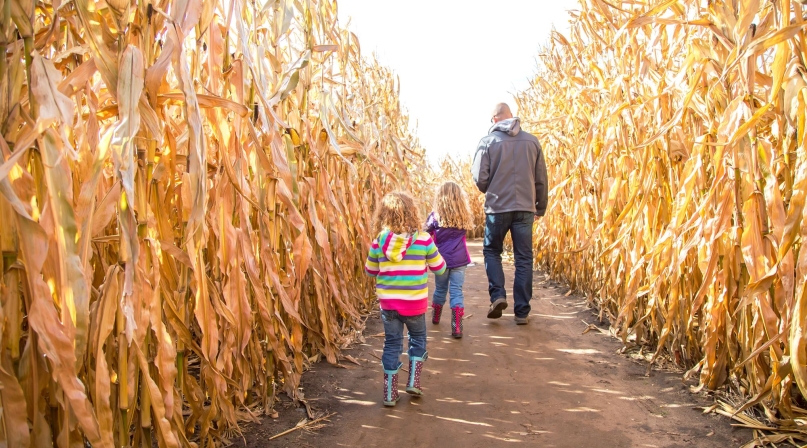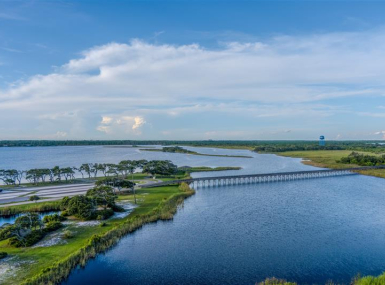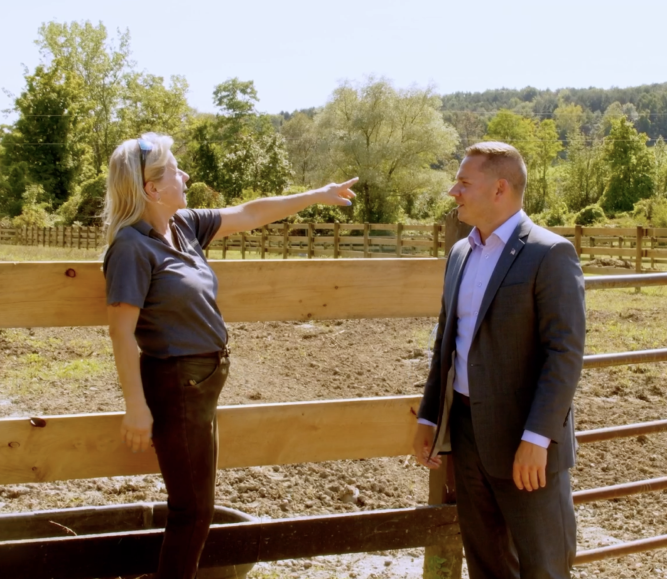Counties hurdle zoning challenges for agritourism

These days, it’s a coming-of-age moment for wedding guests to show up at a farm. Call it a “barn mitzvah.”
But what’s a wedding without guests? Those guests mean traffic. And nobody drives out to the country without dinner and dancing, so now there’s music. And if nobody’s getting married some weekends, how about concerts, since the infrastructure is in place and there’s an opportunity for landowners to make money?
But back to that barn — it was built to store things, not hold people.
Does it pass fire codes? Counties often find themselves in-between landowners who have grand visions for their property and neighbors who expected, thanks to zoning, to be living in a quiet agricultural community.
Learn more
Counties also help entrepreneurs work within their zoning to bring their farm businesses to maturity. And in some cases, all they have at their disposal is a special use permit.
“The old ‘pick your own apples’ orchard, that’s a pretty innocent use, but the ‘pick-your-own vegetable patch’ has evolved to Friday night concert series, or ‘we want to have events,’ or ‘we want to have weddings.’ We want to support that kind of development in the county, but also make it safe,” said Brian McDonough, Polk County, Iowa’s land use planning coordinator, during last year’s Iowa State Association of Counties’ Annual Conference.
Agritourism generally refers to operations related to agricultural land, including agricultural experience education — demonstrating how farms work, picking your own food or riding a tractor or hay trailer or business operations on a rural property — including wineries, distilleries, breweries and bed and breakfasts. The extent to which counties have authority over zoning or code enforcement varies dramatically, but there is generally some point at which counties can apply control over land use.
Ann Mallek grew up on a farm in Albemarle County, Va. in a district she now represents on the county’s Board of Supervisors. State law restricts county control over winery operations, but the county still has use of its noise ordinance and zoning control over other farm-related businesses.
“We have occasionally had to ask people if they want to be the one responsible for shutting down all outdoor amplified music and ruin it for everybody,” she said.
“That has been a fairly compelling message.”
Her biggest concern has been the addition of businesses with a tenuous link to agricultural use and their negative externalities.
“We have had several applications for brewery licenses, but there’s nothing agricultural particularly about a brewery because they can’t grow the barley, they can’t grow the hops and to me it’s not a justifiable link to have a few elderberry bushes and therefore call yourself a farmer when you’re importing industrial amounts of stuff over very narrow country roads and great big tanker trucks,” she said.
Local outcry tends to prompt county action. Skagit County, Wash. is in the middle of setting policy for events in agricultural areas.
The Board of Commissioners, Planning Commission and Agricultural Advisory Board have been collaborating on a plan to cut the number of events held on agricultural zones by half, to 12 per year. After 200 people showed up to a planning commission public hearing, the Board of Commissioners declared a moratorium on new events in agricultural areas.
“We’ve had a special use permit available for 10 years that allows you to hold 24 events per year, but only two people have applied,” said Commissioner Ron Wesen.
“Right now, we’re looking for voluntary compliance agreements with the previous [events] that were there,” he said.
“We want to make sure that they have the critical area reviews of their property: The structural integrity of what’s there, floodplain design, fire protection, health regulations. Those are things we’re looking at. It’s not fair if somebody new comes in … and they go through all the rules and these other people have never gone through the rules.”
In Miami-Dade County, Fla., the new Miami-Redland Agritourism District will allow expanded uses of land for weddings, hayrides, corn mazes, food trucks and other businesses to operate without certificates of use, though limiting the size of buildings, in an agricultural boundary.
Other counties have streamlined permitting and conditional use permit processes related to various uses.
Counties closer to population centers typically have more involved zoning ordinances.
When Lawrence County, Tenn. Executive David Morgan, a farmer, follows through on his plan to add tiny homes to his land to serve as short-term rentals, he’ll face no resistance from local regulations, because his rural county has none. But he doesn’t consider that carte blanche.
“We live by the Golden Rule here — we can work things out among ourselves without government having to oversee our conduct,” he said, noting that property sizes in his county also tend to provide a buffer for noise.
Morgan wants to give visitors the agricultural experience, specifically a close look at the regenerative agriculture he practices.
But as the Nashville exurban area expands, he anticipates some friction with people who are accustomed to a more structured system.
“There are a lot of people moving here from other cultures, other ways of life,” he said.
“They come from cities and counties that have zoning laws that are as long as your arm.”
Related News

California counties fight agricultural crime
Sheriffs' offices and prosecutors in California's central valley make specific efforts to prevent and prosecute crimes against the agricultural community.

House Agriculture Committee introduces 2026 Farm Bill
On February 13, House Agriculture Committee Chairman G.T. Thompson (R-Pa.-15) introduced the House version of the 2026 Farm Bill, the Farm, Food, and National Security Act of 2026.

Congress increases oversight of Gulf Coast Restoration Trust Fund
On February 3, Congress passed new funding and authority for an audit and expanded oversight of the Gulf Coast Restoration Trust Fund, which houses federal funds for recovery from the Deepwater Horizon oil spill disaster. The provision was included in the Financial Services-General Government appropriations bill (FSGG), which was one of five included in a minibus package passed by Congress (P.L. 119-75).
County News
Agritourism helps boost rural counties

